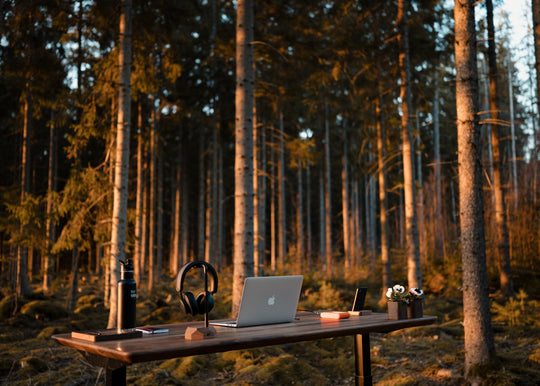
5 Eco-Friendly Tips. What Can Everyone Do For the Environment Today?
Earth Day is an international event that has been organized since 1970 to inspire people to take positive action for the environment. Currently, Earth Day is celebrated in 190 countries around the world. Anyone can become part of any project registered on the website or register their own event related to education or action for environmental protection. An important goal of Earth Day is to spread the awareness that each of us has a real impact on the future of our planet and that each of our daily choices brings us closer to a better, ecological future.

Think globally - act locally
The ecological transformation of the world requires systemic, political, and business changes. Earth Day enables millions of voters, consumers, and investors, to unite in a powerful social initiative that is hard to ignore. If you care about the environment, remember that systemic changes start with individual decisions. If you want to do something for the environment today, check out our 5 eco-friendly tips and celebrate Earth Day every day by making these small, green decisions!
1. Choose ecological brands
By choosing eco-friendly brands or buying products from eco-friendly lines, you are making a statement that a sustainable development strategy is important to consumers! Buying specific products is similar to voting for the values that you think the company should represent. For example: by choosing vegan substitutes for popular snacks such as ice cream, crisps, or jelly beans, you contribute to the fact that producers record profits related to the “veg” sector - thus encouraging them to expand their offer in this area.
What can you do today?
Choose products with organic labels and certificates.
Certificates are good indicators to help us determine if a product is eco-friendly. However, it is worth remembering that some companies use unfair sales tactics (the so-called greenwashing), e.g. by placing logos that resemble recognized eco-certificates (such as FSC, OEKO-TEX, CCOF). Therefore, try to verify the ecological signs and certificates that you don't know.
Every time you buy new clothes, ask yourself: who made them?
If you are concerned about the environment, you can check your favorite clothing stores at the Fashion Transparency Index - prepared by the NGO Fashion Revolution.
2. Use less disposable products
On January 1, 2021, the EU has signed Single-Use Plastics Directive. In the US, eight states, including California, Connecticut, Hawaii, New York, and Oregon, have banned single-use plastic bags. Environmental educator Paulina Gorska points out that disposable products, such as cotton swabs, plates, straws, stirrers, or cutlery, should disappear from stores by July 3, 2021, at the latest. Over 85% of the marine environment pollution is plastic - and nearly 50% of this number are disposable products. After 2025, all PET bottles should contain at least 25% recycled plastics.
What can you do today?
Use reusable packaging
These will come in handy when buying vegetables and fruits. When buying coffee to go, use your own thermal coffee cup or, if possible, use reusable cups available in the deposit system.
Do not buy beverages in plastic bottles
Choose filtered water, homemade juices, and lemonade, or beverages in returnable glass bottles.

Photo by Zac Harris on Unsplash
3. Try flexitarianism
According to PETA, meat production consumes an enormous amount of water and increases the emission of greenhouse gases into the atmosphere. More than 80% of agricultural land in the US is dedicated to the production of meat or fodder. Every day, whole unique ecosystems are disappearing from our planet. The UN indicates that limiting the consumption of meat and dairy is crucial to fight against the effects of global warming.
What can you do today?
Become a flexitarian!
A vegetarian or vegan diet may seem very restrictive - many people cannot imagine forever giving up cheese or their favorite meat meals. Thanks to the increasing availability of plant-based alternatives to popular foods, more and more people limit their consumption of meat and dairy products. Flexitarianism, i.e. mostly vegetarian/vegan diet that allows for occasional meat dishes, is the perfect solution for anyone who wants to do something good for the environment but does not want to go entirely plant-based.
Eat one plant-based meal today
We hope we inspired you to eat at least one 100% plant-based meal today! If you need inspiration, be sure to check out our favorite food blogs:

Photo by Brooke Lark on Unsplash
4. Don't waste food
Nearly 830 million people worldwide suffer from hunger. In the US nearly 37 million adults and 11 million children struggle with the problem of malnutrition. At the same time, almost one-third of all food produced for human consumption goes to waste. Furthermore, food waste results in high methane and greenhouse gas emissions and economic losses. Of course, food quality and safety regulations are largely to blame. However, if you, your family, and friends try to buy and use food in a conscious way, together you can save up to several tons of food a year!

Photo by Anita Jankovic on Unsplash
What can you do today?
Share your leftovers
If, for some reason, there is a lot of food left in your fridge that you cannot use, share it with your friends or leave it in a nearby community fridge. The surplus of your food will help people in a difficult financial situation.
Learn to conserve food
Freezing and pickling, preserving and drying - every way is right to save good food from being wasted!
Cook from leftovers
Broth made from vegetable peels, carrot cake made from squeezing pulp, pasta casserole based on yesterday's spaghetti. Try to be creative in the kitchen - use interesting spices and food processing techniques to transform leftovers into a new, full-fledged, and delicious meal.
Buy seasonally and locally
Food from local suppliers is tasty, fresh, and does not harm the environment - unlike imported vegetables and fruits grown on large plantations.
5. Promote ecological content among your friends and family
Every journey begins with a first step - and every positive change begins with the first vegetable meal or a drink without a straw. Try to encourage your family, friends, or colleagues to learn simple, eco-friendly habits.
At Oakywood, we plant one tree for each product purchased. During Earth Day, we decided to double the rate - that's why, in one day, we funded the planting of 264 trees! Thank you!








